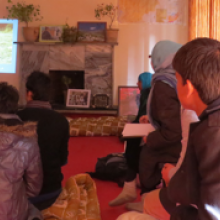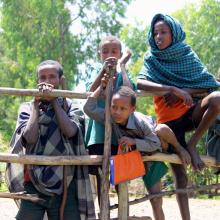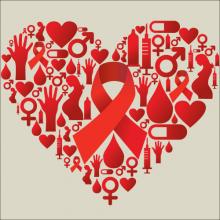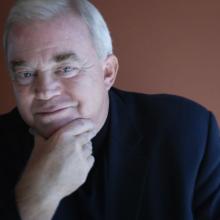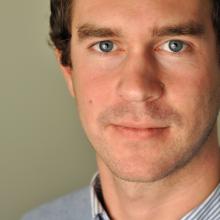foreign aid
Religious leaders, including some who spoke at President Trump’s inauguration, are calling on Congress to protect foreign aid that helps the needy across the globe.
Trump’s 2018 budget proposal calls for $25.6 billion in funding for the State Department and the U.S. Agency for International Development. That’s a decrease of $10.1 billion, or 28 percent, from the 2017 budget.
Donald Trump’s pick for secretary of state, ExxonMobil CEO Rex Tillerson, has come under fire for his friendship with Russian president Vladimir Putin – who is suspected of trying to tip the election to Trump – his lack of diplomatic experience, and the fact that he is a corporate bigwig who champions fossil fuels, even as the threat of global warming grows.
But Tillerson, whose nomination was announced on Dec. 13, may also face criticism from an unexpected quarter – social conservatives whose support was critical to Trump’s unexpected election last month.
The turn of each calendar year is often filled with an influx of charitable giving, much of which intends to assist those far beyond the borders of the United States. As rigorous debates surround the ethics and oversight of such foreign assistance endeavors, one of the more innovative contributions to this important conversation was produced by South Africa's renowned theologian, the late Steve de Gruchy. In consideration of the Magi and their Epiphany visit with Joseph, Mary, and the newly born Jesus in Matthew 2:1-12, de Gruchy offers a striking interpretation of the biblical text and considers its direct relationship with international relief efforts. As private giving directed to foreign aid continues to grow ( from $8.4 billion in 2000 to $19.1 billion in 2012 ), de Gruchy shows how benevolent intent can lead to oppressive impact, and Epiphany provides important wisdom to navigate the complexities of our policies and practices.
The tragedy caused by the recent 7.8-magnitude earthquake will increase as time wears on: the death toll now exceeds 7,500; injuries and damage are widespread; and some 8 million people need humanitarian aid. The Nepalese government reports that up to 90 percent of health facilities are partially damaged in the worst hit areas, and one of the largest private hospitals in the capital city of Kathmandu is inoperable. Some 1.7 million children are in need of food assistance. This crisis is only going to get worse.
In comes foreign aid.
“And what does the Lord require of you? To act justly and to love mercy and to walk humbly with your God.” [Micah 6:8]
Too often, perversions of our world’s religious traditions make the daily news for their violence, corruption, greed, and prejudice. Meanwhile, authentic representatives of those traditions are often busy doing good — good that goes largely unnoticed. That’s why I’m glad that a diverse group of religious leaders are sharing about seven ways authentic people of faith can work together to make a better world.
I served as a progressive evangelical pastor for 24 years, and during those years, I saw the evangelical movement struggling with its identity. The best versions of evangelicalism, whether they were labeled conservative or progressive, always took seriously passages like Matthew 25, where Jesus said, “For I was hungry and you gave me food, I was thirsty and you gave me drink.” Those verses continue to inspire evangelicals of all persuasions to engage in life-giving mission — and in particular, to engage constructively in the world in seven positive, reconciling, and healing ways.
If you invest just a few minutes over the next seven days thinking and speaking up about these seven ways to participate in our world, I believe by week’s end you will be moved to action and in it find a richer, more faithful life:
Two weeks ago in a room in Kabul, Afghanistan, I joined several dozen people — working seamstresses, some college students, socially engaged teenagers, and a few visiting internationals like myself — to discuss world hunger. Our emphasis was not exclusively their own country’s worsening hunger problems. Rather, tmhe Afghan Peace Volunteers, in whose home we were meeting, draw strength from looking beyond their own very real struggles.
With us was Hakim, a medical doctor who spent six years working as a public health specialist in the central highlands of Afghanistan and, prior to that, among refugees in Quetta, Pakistan. He helped us understand conditions that lead to food shortages and taught us about diseases, such as kwashiorkor and marasmus, which are caused by insufficient protein or general malnutrition.
We looked at U.N. figures about hunger in Afghanistan, which show malnutrition rates rising by 50 percent or more compared with 2012. The malnutrition ward at Helmand Province’s Bost Hospital has been admitting 200 children a month for severe, acute malnutrition — four times more than in January 2012.
A recent New York Times article about the worsening hunger crisis described an encounter with a mother and child in an Afghan hospital: “In another bed is Fatima, less than a year old, who is so severely malnourished that her heart is failing, and the doctors expect that she will soon die unless her father is able to find money to take her to Kabul for surgery. The girl’s face bears a perpetual look of utter terror, and she rarely stops crying.”
Photos of Fatima and other children in the ward accompanied the article. In our room in Kabul, Hakim projected the photos on the wall. They were painful to see and so were the nods of comprehension from Afghans all too familiar with the agonies of poverty in a time of war.
By the time President Obama walked off the stage at Chicago’s McCormick Place after delivering his acceptance speech early Wednesday morning, pundits already were screaming HERE COMES THE FISCAL CLIFF!
And while it might have been a nice idea to take a collective breath after such a divisive election season before new screeching began, the pundits were not wrong.
Be warned: The Fiscal Cliff approaches. On Jan. 2, 2013, to be exact.
Now, I am many things, but an economist (or even a person remotely comfortable with numbers) is not one of them. So let me explain to those of you who are like me, in the simplest terms possible, what this proverbial cliff is all about.
In the wake of the debt ceiling crisis last summer, Congress and President Obama agreed to enter into negotiations to enact a 10-year deficit reduction package in excess of $1.2 trillion.
If an agreement could not be reached, a mandatory, across-the-board reduction in spending (also known as “sequester” or “sequestration”) would occur. All discretionary and entitlement spending -- with a few exceptions -- would be subject to sequestration....
Under sequestration, the U.S. foreign aid that has made such a tremendous difference in Ethiopia and in the lives of countless millions of desperately poor Africans (and others) is in grave jeopardy.
LALIBELA, Ethiopia -- You know the images you have in your mind of Ethiopia from 27 years ago? The ones from the nightly news reports on TV about the famine in the Horn of Africa as the death toll mounted and horror stories grew more unfathomable by the day.
Scorched, cracked earth. The carcasses of ematiated, dead cattle lying in the baking sun. Hundreds of thousands of stick-thin refugees wandering in the dust, hoping to have enogh strength to make it to a camp that might have water and food. The babies and children with orange hair and distended stomachs -- indications that they were in the advanced stages of malnutrition and starvation.
I am happy to report that the Ethiopia of 2012 is not the Ethiopia of 1985.
Thanks to global efforts (Live Aid, etc., back in the day), foreign aid, and the very real efforts of the Ethiopian government and people themselves, the land I saw earlier this month looks nothing like those old images in my mind. In fact, parts of the country that we traveled through were so verdent and lush -- farmlands rolling out in various shades of green like a St. Patrick's Day quilt -- that if you'd blindfolded me when I got on the plane and taken the blind of when I stepped of the bus in the rural area outside Bahir Dar near the Sudanese border, I might have thought I was in Ireland's County Kerry rather than Ethiopia's Amhara Region.
Ethiopia is beautiful. In every way. It's people. It's resilience. It's ingenuity and entrepreneurial spirit. In the way it cares for its land and its people, and the way they care for each other and their visitors. There is a spirit in Ethiopia I've experienced only rarely elsewhere. In a word I'd call it HOPE. But it's a hope not based on daydreams and fairytales. It's a hope based in hard work, smart planning, and forward thinking.
In an OpEd that appeared on POLITICO Monday, Mike Huckabee, the former Republican governor of Arkansas, and Blanche Lincoln, the former Democratic senator from Arkansas -- who together co-chair ONE Vote 2012, a non-partisan campaign to make global health and extreme poverty foreign policy priorities in the 2012 presidential election, wrote about the importance of maintaining U.S. foreign aid to the developing world that has helped make significant improvements in the health and sustainability of myriad nations, including many on the continent of Africa.
They wrote, in part:
It might come as a surprise to learn that less than one percent of the U.S. budget is spent on foreign assistance. It might even be shocking to discover that, despite this relatively small amount, these funds are literally saving millions of lives and improving the lives of many more millions of people.
For example, American investments in cost-effective vaccines will help save nearly 4 million children’s lives from preventable diseases such as pneumonia and diarrhea over the next five years. We’ve also helped to deliver 290 million mosquito nets to Malaria-stricken countries, and put 46 million children in school for the very first time. And thanks to the leadership of Presidents George W. Bush and Barack Obama, 8 million HIV/AIDS patients now have access to life-saving treatments, up from just 300,000 a decade ago, making an AIDS-free generation a real possibility within our lifetimes.
I wonder what would happen if the daily barrage of negative, misleading political campaign ads were replaced just for a day by a one-minute clip from the opening ceremony of the International AIDS Conference in Washington, D.C., last week.
This replacement ad would feature a beautiful, regal woman from Nigeria sharing a heartfelt and poignant ‘thank you’ to the American people for literally saving her life by providing access to antiretroviral drugs — medicine that creates a modern-day “Lazarus effect” in people whose immune systems have been ravaged by AIDS — and also ensures that her daughter was born HIV-free. I wish every member of Congress could have heard these words, a ‘thank you’ that echoes what many nations in sub-Saharan Africa are experiencing as they work to turn the tide of this deadly disease.
This one mother and child from Nigeria are only a snapshot of the millions of lives that have been transformed by American generosity and leadership through life-saving investments in the President's Emergency Plan For AIDS Relief (PEPFAR) and the Global Fund to Fight AIDS, TB and Malaria — which have increased the number of Africans on treatment from a shameful 50,000 in 2002 to more than 4 million today.
Former First Lady Laura Bush spoke with ABC News, expressing the importance of foreign aid and programs like the President's Emergency Plan for AIDS Relief (PEPFAR). In light of some in theTea Party calling to eliminate aid completely, the former First Lady said she thinks others don't realize how miniscule the amount actually is.
She said her husband President George W. Bush started the program because millions were dying in Africa from the epidemic.
"It would've been a crime I think to know that we had the capacity of helping people around the world live and not do anything about it.," Bush said.
Both Republicans and Democrats have a religion problem and it has nothing to do with same-sex marriage, abortion or religious liberty. Rather it is budgets, deficits, and debt ceiling deadlines that are their serious stumbling blocks.
That’s right, in a city deeply divided between the political right and left there is a growing consensus from religious leaders about getting our fiscal house in order and protecting low-income people at the same time. Together, many of us are saying that there is a fundamental religious principle missing in most of our political infighting: the protection of the ones about whom our scriptures say God is so concerned.
Indeed, the phrase “a budget is a moral document” originated in the faith community, and has entered the debate. But those always in most in jeopardy during Washington’s debates and decisions are precisely the persons the Bible instructs us clearly to protect and care for — the poorest and most vulnerable. They have virtually none of the lobbyists that all the other players do in these hugely important discussions about how public resources will be allocated.
For us, this is definitely not a partisan issue, but a spiritual and biblical one that resides at the very heart of our faith. It is the singular issue which has brought together the U.S. Conference of Catholic Bishops, the National Association of Evangelicals, the Salvation Army, and the leaders of church denominations, congregations, and faith-based organizations across the nation.
During the first-ever all-virtual interview conducted by Americans via Google+'s "hangout" group video chat feature, a young, homeless veteran in Boston asked President Obama why the United States still gives money to countries such as Pakistan, that are known to fund terrorism — especially when there are so many veterans living on the streets after returning from the war. The session was broadcast live via YouTube.
Watch the video of their conversation inside the blog...
On a recent trip to the African nation of Ghana, Bono of U2 and economist Jeffrey Sachs spoke to the U.K. Guardian newspaper about their hopes for the future of foreign aid.
"There's one thing that might help with aid cynics. Because clearly no one likes the culture of dependency," Bono said. "No one's arguing for it. We're arguing to end it. I think there's something a bit funky about aid as it stands right now. The two most important parties involved in the transaction – the taxpayer who's providing the resources and the person who needs those resources to stay alive or keep their family alive – are the two people who know the least about what's going on. So that has to change."
If the GOP primaries were like Old Country Buffet, I’d be happy.
Think about it. There wouldn’t be so much money involved and we could pick only the stuff we liked and ignore the rest.
And of course, everyone knows the basic rules of smorgasbord grazing, such as you can’t get decent sushi in the Midwest or proper social conservatives from Massachusetts.
I would never have been mistaken as a political supporter of President George W. Bush. But in his early days as president, I was invited to have conversations with him and his team about faith-based initiatives aimed at overcoming poverty, shoring up international aid and development for the most vulnerable, and supporting critical agendas such as international adoptions of marginalized children and the broken domestic foster care system.
My invitations to the Bush White House ended when I strongly and publicly opposed the Iraq War. But I continued to support the administration’s efforts to combat poverty and disease, especially Bush’s leadership in combating HIV/AIDs, malaria, and massive hunger in the poorest places in Africa.
That agenda was called “compassionate conservatism” and I was grateful for it. Back then, Republican leaders could be fiscally conservative, favor “small government,” and believe in the free market, for example, but also believe that government should and must partner with the private sector — especially non-profit and faith-based organizations — to help lift people out of poverty, both abroad in the developing world and here at home in the richest nation on the planet. Such a conviction requires two things: A genuine empathy and commitment to the poor, and a more balanced and positive view of government — neither of which were much evident in the GOP’s right-wing quarters, where the compassionate conservative agenda was opposed by party leaders such as Tom DeLay and Dick Armey.
I met people like Mike Gerson, who was then George Bush’s chief speech writer and a policy advisor, and is now a columnist for the Washington Post. I was told it was Gerson and the Bush himself who often were the ones to stand up for the compassionate conservative vision at Oval Office meetings.
Social justice is redundant.
Justice, properly understood in a biblical sense, always has social implications.
Personal salvation is redundant in the same way. Salvation, properly understood in a biblical sense, while it may have broader implications, is always personal in nature.
Why the modifiers?
From Judgment To Hope (OPINION); Obama Administration To Consider Gay Rights When Allocating Foreign Aid: Source; Coming Soon To The Southwest: The Age Of Thirst; Iowa Republicans Side With Newt Gingrich Over Mitt Romney On Immigration; Occupy Wall Street Protesters To Occupy Foreclosed Homes The Amazing Rise Of Anna Hazare, India's Gandhi-Like Protest Leader; Arnold Schwarzenegger Urges Candidates To Champion Green Energy; The Bomb Buried In Obamacare Explodes Today-Hallelujah!
HIV/AIDS is a justice issue. The most vulnerable and poorest people still don’t have access to the treatments that save lives. Jesus’ concern for the lives of the sick in Matthew 25 calls Christ-followers to do everything in our power to make these life-saving treatments available to every person in need.
“America is a great idea,” Bono said.
Fundamental to that idea is the belief that all people are created equal and endowed by their creator with the intrinsic right to life, liberty and the pursuit of happiness.
The right to life, the right to liberty, and the right to pursue happiness each demand the will and resources make an AIDS-free generation a reality by 2015.
By 2015, we could have an AIDS free generation.
AIDS was first identified nearly 30 years ago and has claimed countless lives. Currently, 1,000 babies around the globe are born with the virus each day. During much of the past few decades it’s been hard to see much hope when it comes to turning the tide against this disease.
But, thanks to smart public health decisions, public investment in strategies that work, and innovative implementation by NGO’s, we can now begin to envision a day when this mountain will be moved. During FY 2011 PEPFAR, (The President’s Emergency Plan for AIDs Relief) supported the prevention of 200,000 children contracting HIV/AIDS from their mother.
With continued investment we are just a few years away from preventing nearly ALL children from being born with the virus.





